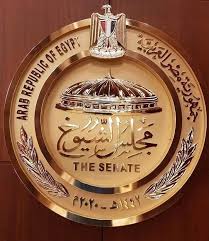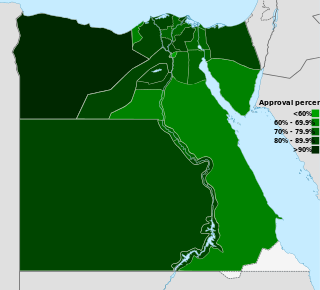Liberalism in Egypt or Egyptian liberalism is a political ideology that traces its beginnings to the 19th century.

The Senate is the upper house of the bicameral Parliament of Egypt since its introduction in the 2019 Egyptian constitutional referendum and the subsequent 2020 Egyptian Senate election. The current president of the Senate is Abdel-Wahab Abdel-Razeq.

The Parliament of Egypt is the bicameral legislature of the Arab Republic of Egypt. It is composed of an upper house and a lower house.

The Constitution of the Arab Republic of Egypt was the former constitution of Egypt. It was adopted on 11 September 1971 through a public referendum. It was later amended in 1980, 2005, and 2007. It was proclaimed to update the democratic representative system in assertion of the rule of law, independence of the judiciary, and party plurality. On 13 February 2011, the Constitution was suspended following the resignation of President Hosni Mubarak as a result of the 2011 Egyptian Revolution. On 30 March 2011, it was "effectively voided" after a new provisional constitution was passed by the country's ruling Supreme Council of the Armed Forces. It has since been superseded by the Egyptian Constitution of 2012 and the current Egyptian Constitution of 2014.

Presidential elections were held in Egypt in 2012, with the first round on 23 and 24 May 2012 and the second on 16 and 17 June. The 2012 Egyptian Presidential election was the first democratic presidential election of Egypt's history. The Muslim Brotherhood declared early 18 June 2012, that its candidate, Mohamed Morsi, won Egypt's presidential election, which would be the first victory of an Islamist as head of state in the Arab world. It was the second presidential election in Egypt's history with more than one candidate, following the 2005 election, and the first presidential election after the 2011 Egyptian revolution which ousted president Hosni Mubarak, during the Arab Spring. However, Morsi's presidency was brief and short-lived, and he later faced massive protests for and against his rule, only to be ousted in a military coup in July that year.

Parliamentary elections were held in Egypt from 28 November 2011 to 11 January 2012, following the revolution that ousted President Hosni Mubarak, after which the Supreme Council of the Armed Forces (SCAF) dissolved Parliament. However the dissolution was ruled unconstitutional and Parliament was reinstated. Originally, the elections had been scheduled to be held in September 2011, but were postponed amid concerns that established parties would gain undue advantage.

A constitutional referendum was held in Egypt on 19 March 2011, following the 2011 Egyptian revolution. More than 14 million (77%) were in favour, while around 4 million (23%) opposed the changes; 41% of 45 million eligible voters turned out to vote.

The Free Egyptians Party is an Egyptian liberal party, founded after the 2011 Egyptian revolution. It supports the principles of a liberal, democratic, and secular political order in Egypt. The Free Egyptians Party was the largest party in the House of Representatives. The party is a founding member of Al Hurriya Liberal Network.
The al‑Nour Party(Arabic: حزب النور, romanized: Ḥizb an-Nūr), or "Party of The Light", was one of the political parties created in Egypt after the 2011 Egyptian Revolution. It has an ultra-conservative, Islamist ideology, which believes in implementing strict Sharia law. It has been described as the political arm of the Salafi Call Society, and "by far the most prominent" of the several new Salafi parties in Egypt, which it has surpassed by virtue of its "long organizational and administrative experience" and "charismatic leaders". Its political aim is to establish a theocratic state on the lines of Wahhabism like in Saudi Arabia. Saudi Arabia was found to be the main financer of the party according to the public German television news service ARD.

Mohamed Mohamed Morsi Eissa al-Ayyat was an Egyptian politician, engineer, and professor who served as the fifth president of Egypt, from 2012 to 2013, when General Abdel Fattah el-Sisi removed him from office in a coup d'état after protests in June. An Islamist affiliated with the Muslim Brotherhood organization, Morsi led the Freedom and Justice Party from 2011 to 2012.

The Egyptian Constituent Assembly of 2012 (CA) is the committee for the creation of a new Constitution of Egypt. The Muslim Brotherhood had announced that the Constituent Assembly would vote on the constitution on 29 November 2012. The Constituent Assembly will be able to avoid its possible dissolution by voting on the constitution earlier than the release of a ruling by the Supreme Constitutional Court on the assembly's legitimacy; the ruling was expected to occur on 2 December 2012. The court has postponed the verdict in response to protests. The Constituent Assembly approved the constitution on 29 November 2012; more than 16 hours were spent voting on its articles.
Following the 2011 Egyptian revolution, the Muslim Brotherhood in Egypt became one of the main forces contending for political power in Egypt against the Supreme Council of the Armed Forces (SCAF) and other established centers of the former Hosni Mubarak regime.

The Strong Egypt Party is an Egyptian centrist political party founded in 2012 by former presidential candidate Abdel Moneim Aboul Fotouh.

The National Salvation Front is an alliance of Egyptian political parties, formed to defeat Egyptian President Mohammed Morsi's 22 November 2012 constitutional declaration. The National Front for Salvation of the Revolution has more than 35 groups involved overall. Observers are concerned that the NSF will not be able to become a coherent political force because the different parties agree on opposing Morsi, but their views on other subjects diverge.

The Constitution of the Arab Republic of Egypt was the former fundamental law of Egypt. It was signed into law by President Mohamed Morsi on 26 December 2012, after it was approved by the Constituent Assembly on 30 November 2012 and passed in a referendum held 15–22 December 2012 with 64% support, and a turnout of 33%. It replaced the 2011 Provisional Constitution of Egypt, adopted in 2011 following the Egyptian revolution. On 3 July 2013, the constitution was suspended by order of the Egyptian army. On 8 July 2013, acting President Adly Mansour issued a decree that envisaged the introduction of amendments to the constitution and put them to a referendum; if approved, the suspended-constitution would be restored into law. The current constitutional declaration has the power of a constitution; it outlines the authorities of the president and establishes many rights.

The 2012–2013 Egyptian protests were part of the crisis in Egypt including the June 2013 protests, the July 2013 coup d'état, and part of the post-coup unrest. They saw varying opposition against three contiguous heads of state; namely, the Supreme Council of the Armed Forces (SCAF), Muslim Brotherhood, and the de facto ruling Egyptian Armed Forces.

The Anti-Coup Alliance is a coalition in Egypt formed to reverse the ouster of former president Mohamed Morsi. The coalition is made up of approximately 40 Islamist parties and groups.

A constitutional referendum was held in Egypt on 14 and 15 January 2014 and with Egyptians abroad voting between 8 and 12 January. The new constitution was approved by 98.1% of voters. Turnout was 38.6%.

The Constitution of the Arab Republic of Egypt is the fundamental law of Egypt.

A constitutional referendum was held in Egypt between 20 and 22 April 2019, The main proposed amendments were re-establishing the presidential term to six years, from four previously, and removing the limit of two terms on the President, thereby allowing President Abdel Fattah el-Sisi to potentially remain in power until 2030. The changes were approved by 88.83% of voters who voted, with a 44% turnout.














